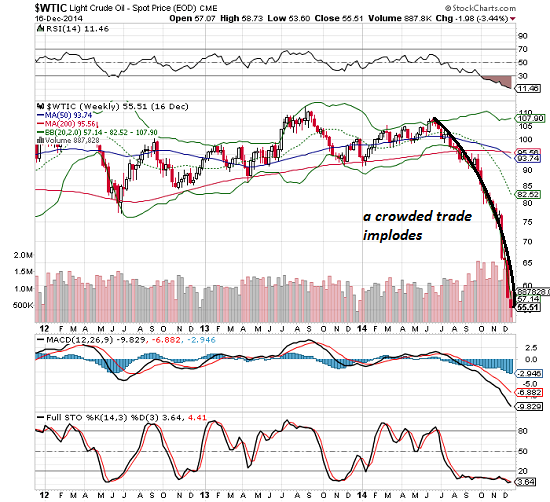Page added on December 23, 2014
Will The Fed Intervene In The Oil Market?

In a larger sense, the Fed is already intervening in the oil sector via its zero interest rate policy (ZIRP) and its unlimited liquidity for financial speculation.
The problem with financializing a critical sector of the economy is the financialization process transforms it into a systemic risk. The trajectory of every financialized sector is the same: debt and leverage are piled ever higher on a base of collateral that eventually collapses as heightened risk becomes the Monster Id of a crowded trade.
Once the Monster Id burns through the firewalls that were supposed to limit risk, the crowded “safe” trade blows up and the conflagration quickly spreads throughout the financial system.
Every financialized sector thus has the potential to take down the entire financial system.
The mortgage sector is a prime example of this dynamic. The financialization of the mortgage industry created the subprime mortgage firetrap, which inevitably caught fire and threatened to burn down the entire global financial system.
The central bank that encouraged the financialization then has no choice but to intervene to save the system from the toppling dominoes of leverage and risk. Once the mortgage sector was fully financialized–securitized, tranched, packaged into collateralized debt obligations and other derivatives–the implosion of the weakest link (subprime mortgages backed by bogus collateral and liar loans) was baked into the financialization process.
As the systemic dominoes started falling, the Too Big to Fail (TBTF) banks had to be bailed out to the tune of trillions of dollars in guarantees, backstops and loans. As correspondent Mark G. has noted, the debtors are left to suffer the consequences of their risky debt, but the big creditors are saved from the consequences of their bad bets.
This is the essence of moral hazard–risk is disconnected from consequence by central bank intervention. Gains are privatized, losses are socialized, i.e. borne by the taxpayers and savers whose interest has been siphoned to private banks by the central bank.
Now the latest sector to be financialized, oil, has blown up, falling in a parabolic freefall from over $100/barrel to a recent low around $53. And once again, the sector’s losses are threatening to undermine sectors with no direct connection to oil.

When central banks feign disinterest in intervention, it can be taken as a sign that they’re either planning intervention or are already actively intervening via proxies.Central banks play two hands at all times: their propaganda campaign of talking up their intervention (“whatever it takes,” etc.) and their sustained opaque interventions via proxies.
When it behooves central banks to appear actively engaged in saving stock and bond markets from melting down, their interventions are publicly flogged on a weekly or even daily basis– for example, the QE campaigns 1,2 and 3.
When their interventions exceed their mandate for outright manipulation of markets–for example, buying future contracts in the S&P 500 within the last 15 minutes of trading to push the markets into the green–it’s all kept far from the public eye, hidden behind proxies.
Given the systemic risks arising from the meltdown of oil, why would the Federal Reserve let this latest implosion spread to the entire over-leveraged system? After six years of continual intervention in financial markets, why would the Fed suddenly cease its labors to keep imploding sectors from destabilizing the rest of the rickety structure?
It beggars belief that the Fed would stand by doing nothing, while the financial dominoes from oil’s 50% decline start toppling.
The question isn’t, why would the Fed intervene in the oil market? The question is, why wouldn’t the Fed intervene in the oil market?
The Fed, via proxies, might buy oil futures contracts to prop up the collateral, and (again through proxies) it might even start buying up impaired high-risk bonds based on oil.
In a larger sense, the Fed is already intervening in the oil sector via its zero interest rate policy (ZIRP) and its unlimited liquidity for financial speculation.Should the Fed turn the dial of intervention up by buying futures and oil-based bonds, it is not a new policy–it is simply a matter of degree. The intervention has been going on in every sector since 2008. The implosion of the oil sector is simply the latest outbreak of consequence following cause.
Charles Hugh-Smith of OfTwoMinds blog
11 Comments on "Will The Fed Intervene In The Oil Market?"


bobinget on Tue, 23rd Dec 2014 3:30 pm
http://seekingalpha.com/article/2776435-understanding-the-oil-price-war
Perhaps this pro writer can explain his better then I’ve been able so far.
I do disagree with language. The author
uses the term “oil price war”.The Proxy War in Syria, what this is really all about, has been going on four years, 250,000 dead, 5 million in refugee status, infrastructure in ruin. How can we charterize
that as a ‘price war’?
The Saudis can’t break Iran, Iraq and Venezuela but they can stop Russia and Iran from supporting
the Syrian leadership, bloody President Assad.
If we can’t understand ‘Proxy Wars’ how are we to get a grip on more nuanced ‘Cyber Warfare’?
penury on Tue, 23rd Dec 2014 4:17 pm
Of course the FED is intervening in the oil market. Show me a market anywhere in the world that the CBs do not interfere in the market for the benefit of that government. The question is for how long can they keep production supported while suppressing price. If you are nation which can print unlimited numbers of fiat then you can keep it up for a loooong time. At least long enough to bankrupt other countries whom you perceive as (unfriendly).
Nony on Tue, 23rd Dec 2014 4:28 pm
Doomer conspiracy theory. That’s private money in the oil patch. Solyndra was the government money.
GregT on Tue, 23rd Dec 2014 4:50 pm
More “doomer conspiracy theory”:
Oil price drop means lost billions for Canada, CIBC says
Recent dive in oil prices ‘an unprecedented development for the Canadian economy,’ bank says
http://www.cbc.ca/news/business/oil-price-drop-means-lost-billions-for-canada-cibc-says-1.2874641
ghung on Tue, 23rd Dec 2014 6:25 pm
Nony: “…That’s private money in the oil patch.”
Sure, Nony. Lehman Brothers was ‘private’ money too.
Northwest Resident on Tue, 23rd Dec 2014 6:48 pm
“The $300–$400 billion overall annual economic gain from the oil & gas boom has been greater than the average annual GDP growth of $200–$300 billion in recent years—in other words, the economy would have continued in recession if it were not for the unplanned expansion of the oil & gas sector.”
That’s from an article on ZH, link below.
But I strongly disagree with the “unplanned expansion of the oil & gas sector” portion of that quote.
I just read another article today that clearly explains how the FED’s QE and ZIRP policies specifically enabled the “expansion of the oil and gas sector” to launch the “fracking boom”. To launch the fracking boom and other unconventionals, and to create all those jobs and to contribute such a large chunk to GDP (growth), LOTS of cheap and free floating money was needed. QE and ZIRP combined did that. And a lot of propaganda went right along with it, hyping shale oil investments, luring the muppets in. While at the same time, ZIRP had the effect of forcing investors out of “safe” mutual bond funds and into riskier investments, such as shale production, where their muppet money was desperately needed.
But all this was just an “unplanned” expansion. Pure coincidence!
Yeah, right.
The FED, and not just the FED but the high level bankers and masters of the financial universe all saw this coming. They launched the shale revolution — the direct equivalent of a mammoth “jobs program” — to buy one last big chunk of time before it all falls apart. Now look around yourself. It is starting to fall apart.
But for today, the stock market is soaring like there’s no tomorrow. No connection to reality. Party on dudes! There might not be much of a tomorrow to wake up to one of these days soon approaching.
http://www.zerohedge.com/news/2014-12-23/20-stunning-facts-about-energy-jobs-us
Nony on Tue, 23rd Dec 2014 8:30 pm
It’s private money, NR. You’re just being a black helicopter silly billy.
EB on Tue, 23rd Dec 2014 8:43 pm
Please Nony. The Oil and Gas industry in the US gets subsidies and tax breaks. More than renewable energy too.
Northwest Resident on Tue, 23rd Dec 2014 8:53 pm
Nony — QE drives up asset prices significantly, no fool can deny that fact. Dramatically increased asset prices enable all kinds of trades that free up that increased equity for reinvestment in shale/energy. So, in a sense you’re right, it is “private money”, but in another sense you’re missing the main point. QE created all that “equity”, much of which has been invested in shale/energy.
It looks like you’re on a roll today, Nony. Today, you have been a prolific spewer of nonsense, irrelevant points and assorted bullshit. What?! Relatives are visiting for Christmas holidays and driving you crazy?
Apneaman on Wed, 24th Dec 2014 4:46 am
“While at the same time, ZIRP had the effect of forcing investors out of “safe” mutual bond funds and into riskier investments, such as shale production, where their muppet money was desperately needed.”
Perfect description of what every central bank on the planet has been doing. Many privileged retiree muppets and many who are/were planing to be gonna get fucked royally.
rockman on Wed, 24th Dec 2014 3:29 pm
In reality falling oil prices won’t put bank loans in much jeopardy. In fact, it might prove a net gain in their balance sheets. Compared to their entire loan portfolio on average energy loans represent just 2.4% of the total. And bond holder et al? Tough sh*t: you makes your bets and you takes your chances. LOL.
From…interesting table here:
http://www.businessinsider.com/us-bank-oil-exposure-2014-12
“Oil prices have been crashing for the last few months. When prices get too low, drilling projects become unprofitable, which means companies will struggle to meet their expenses. This includes the interest expenses on their outstanding debt. There has been some concern about the lending exposure banks might have on their balance sheets that could be impacted by falling oil prices. Should these obligations go bad, the banks would have to eat some losses.
RBC Capital Markets analyst Gerard Cassidy and his team dug into company filings for the biggest U.S. banks, and his conclusion is that tumbling oil prices aren’t a big deal. “In terms of portfolio concentration, we believe energy-related lending exposure at the top 20 banks is manageable,” Cassidy writes in a note titled There Won’t Be Blood. “We expect that commodity price volatility could temper loan growth in local economies with significant exposure to the oil industry, but that on the whole the risks posed to large U.S. banks are not material.”
Still, the absolute numbers are big. According to Cassidy, JP Morgan is exposed to around $47 billion worth of energy-related loans. Citi is exposed to $45.2 billion. However, they represent very tiny portions of their overall holdings. Keep in mind, banks are also exposed to the consumer who should benefit from falling gas prices.
“We believe banks in general should benefit from lower oil prices driven by increasing loan growth and rising interest rates from an accelerating economy,” said Cassidy.”